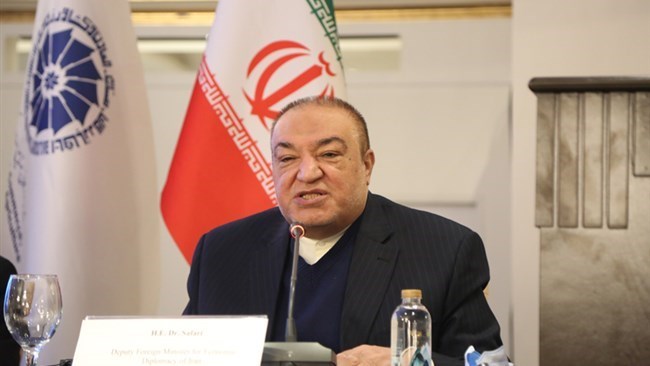Iran's inclusion in BRICS expected to enhance financial exchanges
Iran's Deputy Foreign Minister for Economic Affairs Mehdi Safari highlights Tehran's favorable relations with existing BRICS members and the potential expansion of economic collaboration.
-

Iran's Deputy Foreign Minister for Economic Affairs, Mehdi Safari, speaking at a news conference on November 15, 2022 (Iran Chamber of Commerce, Industries, Mines, and Agriculture)
Iran's membership in the BRICS bloc, which includes Brazil, Russia, India, China, and South Africa, offers a chance to fortify trade connections and financial engagements among these countries, as indicated by Iran's Deputy Foreign Minister for Economic Affairs, Mehdi Safari.
Safari highlighted Iran's favorable relations with existing BRICS members and the potential expansion of economic collaboration.
“We enjoy very good relations with the five member states of BRICS, namely Brazil, Russia, India, China, and South Africa, and can expand trade and economic cooperation within its framework,” he said.
Dilma Rousseff, President of the New Development Bank (NDB), is expected to visit Tehran to discuss Iran's participation as a new BRICS member and its contribution to funding projects, a move seen as advantageous for Iran's trade and economic prosperity.
BRICS, a group of emerging economies, has gained significance in Iran's foreign policy due to its global economic impact. The recent announcement by South African President Cyril Ramaphosa, during the 15th BRICS Summit, of Iran's inclusion as a new member effective January 1, 2024, is noteworthy. Despite US financial sanctions, BRICS has devised approaches to offer loans and services to members, potentially mitigating the effects of these sanctions.
The current total percentage of the #GDP of BRICS member countries is 31.5% of global GDP. pic.twitter.com/w1N2NuANee
— Al Mayadeen English (@MayadeenEnglish) August 24, 2023
Iran's potential membership in BRICS is expected to reinforce multilateralism, amplify its political and economic sway, and contribute to reducing unilateralism, as per Safari.
“Iran’s membership in the BRICS will promote multilateralism and strengthen Iran’s political, economic and trade power and will also weaken unilateralism,” Safari said.
Iran's contributions to scientific advancement, energy, and the establishment of regional corridors connecting various directions via Tehran are also deemed essential to BRICS partners. The consortium collectively represents a significant portion of the world's population and GDP, serving as a counterweight to the G-7, a prominent US-led political assembly.
Safari remarks come shortly after a draft of the final document from the ongoing BRICS summit in Johannesburg on August 22-24 indicates that Argentina, Iran, Saudi Arabia, Egypt, and the UAE are set to join the existing BRICS grouping, according to a report by the Brazilian news portal UOL.
Read next: The BRICS, countering Western centuries-long hegemony

 3 Min Read
3 Min Read








